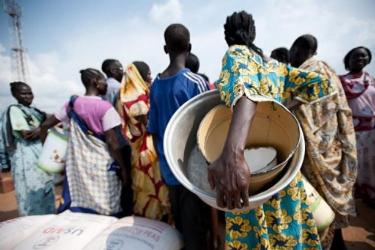WFP pledges commitment to reduce hunger among S. Sudan’s vulnerable
By Julius N. Uma
October 15, 2012 (JUBA) – As the world marked World Food Day on Tuesday, the UN World Food Programme (WFP) reiterated its commitment to reduce hunger and poverty levels among the vulnerable globally.
 WFP Executive Director, Ertharin Cousin, in a statement, said the agency will work closely with communities, the civil society, governments and the private sector to end hunger, which it says is worsened by high food prices.
WFP Executive Director, Ertharin Cousin, in a statement, said the agency will work closely with communities, the civil society, governments and the private sector to end hunger, which it says is worsened by high food prices.
“WFP faces many challenges as we work to ensure that the hungry poor receive the right food at the right time,” said Cousin.
“From the Sahel region stricken by the third drought in recent years, to unrest in the Middle East, to communities whose imported staple foods have become inaccessibly expensive, WFP delivers life-saving food assistance where it is needed most,” he added.
Last year, WFP, the statement noted, reached almost 100 million people in 75 countries, including over 11 million children who received special nutritional support and 23 million children who received school meals or take-home rations.
In South Sudan, WFP has reportedly increased the emphasis on community-based activities to build resilience to shocks and longer-term food security so that communities don’t need food assistance in the near future.
“About a third of the 2.9 million people we’re targeting this year receive food assistance through asset-creating projects that include converting unused land into farmland, building roads for farmers to get their produce to market and constructing dykes that protect their crops from flood waters,” said Chris Nikoi, WFP country director.
He acknowledged hunger in South Sudan as “real” and urged the population in the young nation to switch from nutritious food to cheaper staples, and make decisions that help children especially under the age of two so that they are not prone to vulnerable to disease that rob them of their mental and physical potential.
“Can we build a South Sudan where every child can strive to realize their potential, freed from the blight of under-nutrition and weakness? Can we also build a South Sudan that does not need organisations like WFP?” Nikoi asked.
He further said, South Sudan, despite its enormous challenges, could focus on building community resilience and reinforcement livelihoods; strengthening institutions and systems for enhanced food production and market access; ensuring access to essential services and building leadership and national capacity to as remedies to reduce hunger.
At least 4.7 million South Sudanese, according to a UN assessment conducted early this year, remain food insecure, with up to one million reportedly at risk of facing severe hunger.
(ST)
